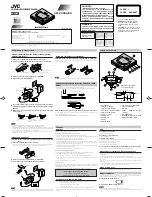
47
CD
A Compact Disc (CD) is a digital data medium that
requires a little care in handling:
•
The surface of a CD may only be
cleaned using a soft, dry cloth. Wipe
in straight lines from the centre
towards the edge.
•
Never use petrol, paint thinners, disc
cleaning fluids or similar agents.
•
CDs must be handled with care to avoid major
damage to the surface. Severely scratched surfaces,
writing on the discs, or sticking labels on the discs
may result in a CD that can no longer be read.
•
CDs should not be heated or bent. Choose a storage
site that fulfils these requirements.
DSP (D
igitaler
S
ignal
P
rosessor)
The
DVD 1235 R
features a freely programmable signal
processor. A DSP can process digital signals in any way,
and that is why they allow better oversampling rates than
standard modules.
DVD
DVD video
exploits the latest state of
MPEG 2 data compression technol-
ogy, which makes it possible to store
an entire cinema film on a single
12 cm CD.
The variable bit rate compression of the DVD, with a read
speed of up to 9.8 Mbit per second, is capable of
recording even the most complex images in their original
quality. The crystal-clear digital pictures have a horizontal
resolution of 720 pixels (points) over more than 500 lines.
This resolution is twice as high as that of the VHS
system, is better than that of LaserDisc, and is directly
comparable to the resolution of digital master recordings
made in recording studios.
DVDs are produced to meet either the PAL or NTSC
video norm. This multi-norm playback device is suitable
for reproducing both types, and plays them in the best
possible quality on your multi-norm TV set. Speech
barriers are a thing of the past, thanks to sound tracks in
up to eight languages, and sub-titles - if present on the
disc - in up to 32 languages. And whether you watch
DVDs on a wide-screen or conventional television, the
quality will always be the same as when you originally
viewed the film at the cinema.
FTS
The
FTS title select program
gives the user the
opportunity to change the sequence of playback of the
tracks on an audio CD. The selection is made and played
using the „OSD“ menu.
Camera angle
Many DVDs and VCDs contain scenes
which were recorded using different camera
view angles. When such a disc is played
back, the screen displays a symbol which
indicates the number of available angles
(e. g. 7) and the currently selected angle (e. g. 3). The
DVD 1235 R
can easily be switched to any of the
different camera viewing angles.
Menu function
A DVD may contain a Disc Menu with selection facilities
for individual
titles
and / or
chapters
. Depending on the
DVD, the disc may also contain alternatives for camera
angle, synchronous languages, sub-titles etc. The menu
function of the DVD player enables you to select these
options from the Disc Menu.
SHUFFLE
In Shuffle mode the tracks of a CD or the titles of an FTS
program can be played back in a randomly selected
order.
CD SINGLES
CD singles are discs of smaller diameter and
correspondingly shorter playing time. The
DVD 1235 R
is
capable of playing CD singles. To load a CD single place
the disc in the circular depression in the centre of the
drawer.
TOC
Internal index (TABLE OF CONTENT) of a CD.
If the TOC area of a CD is unreadable due to damage,
scratches etc., the entire CD is rendered unusable.
TRACK
Track is another termed used for a title on a CD. The
tracks and their duration are stated on the CD sleeve.
3/7
Summary of Contents for 1235 R
Page 1: ...V1 0 Order No 9103 0330 USER MANUAL DVD 1235 R...
Page 2: ...2...
Page 9: ...9...
Page 17: ...17...
Page 20: ...20...
Page 21: ...21 Menu TOOLBAR overview...
Page 24: ...24...
Page 25: ...25 Menu Preferences overview...
Page 29: ...29 Menu SETUP overview...
Page 34: ...34...
Page 43: ...43...








































